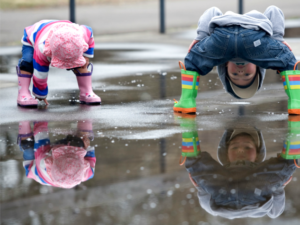Small children are surrounded by an enormous amount of stimuli and information. How to they know what to use and ‘learn’ and what to ignore? Ever since they are newborns children use past experiences to make forecasts. Events that are in line with the forecast (such as a ball that rolls and stops when it hits a wall) does not grab their attention. Instead events that are not in line with the forecast (a ball that rolls over a table but then floats in the air instead of falling to the ground) are interesting because in contrast with past experience. Infants under one year of age prefer playing with an old toy that did something interesting rather than one than did nothing surprising. Infants prefer playing with a ball that rolls across a wall (obviously thanks to some trick) rather than with one that is stopped by a wall. They then proceed to find out the reason behind this surprising behavior. For example they bang the ball repeatedly on the floor to find out something about its consistency. If instead the ball floats in the air instead of falling to the ground their experiment (the study was conducted on 110 infants aged 11 months) will include throwing the ball up in the air rather than banging it on the floor. Surprise towards anything that does not conform with previous experience together with curiosity and experimentation are the instruments used by newborns, children, scientists and Nobel prize winners to understand the world we live in.


Leave a Reply